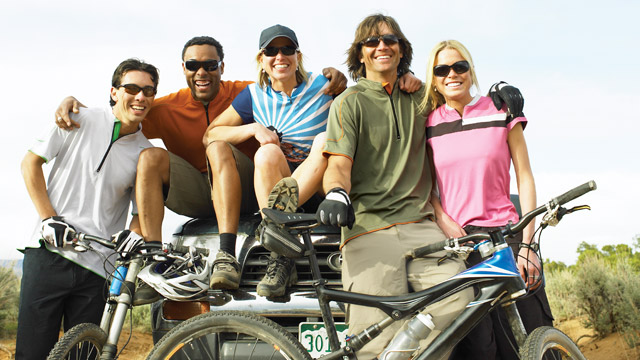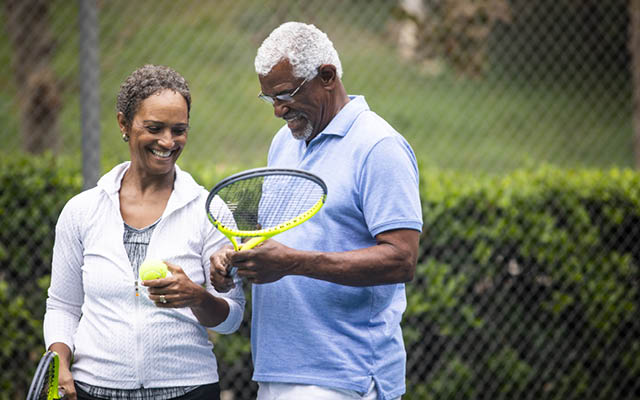Once upon a time, when you first suited up for a youth sporting event, your parents probably weren’t expecting you to become a pro athlete. They signed you up for T-ball, soccer or gymnastics despite your butterfingers or ox-like agility, in hopes that their kid might learn lessons about winning graciously, losing with dignity and sticking to it when things got tough. Yes, playing games was good exercise, but it was the life lessons that mattered most.
For too many of us, as recess became a distant memory, so did the idea that sports can transcend fitness. Instead of looking to improve our minds and spirits, we began gauging progress solely by the size of our muscles or the numbers on a scale. The notion that athletic competition is about greater life lessons and the building of character has been further undermined by headlines about professional athletes who abuse steroids, run into trouble with the law and demand ever-bigger paychecks.
And yet there’s still strong evidence that “sports strongly reinforce certain personal characteristics, things like respecting your opponent, responsibility, persistence and self-discipline,” says Angela Lumpkin, PhD, professor of health, sport and exercise sciences at the University of Kansas and coauthor of Sport Ethics: Applications for Fair Play (McGraw-Hill Humanities, 2002). And that’s true for athletes of any age.
Amateur sports provide a nonthreatening place for competition, with clearly defined rules and low stakes. They also provide a practice ground for managing stress.
The benefits of participating in a sport can seep into your professional life, too. In basketball, for example, “getting everyone to play the right role on the court is the key to success,” says Alan Arlt, founder of the Life Time Fitness basketball program Ultimate Hoops, which includes an adult league. “That certainly translates to the corporate world, where everyone understands their role in the organization.”
Career benefits notwithstanding, playing games like soccer or engaging in individual pursuits such as martial arts can also improve your emotional well-being. In 2005, 89 percent of Canadian adults who participated in sports reported a life satisfaction level of at least 7 on a scale of 1 to 10, compared with only 75 percent of nonparticipants.
This statistical variation may be due in part to the fact that the culture of sportsmanship tends to give participants positive feelings about themselves, win or lose. Those who engage in sports often gain a sense of self-confidence from their experience. “Adult athletes look at sport as helping define themselves as human,” says Lumpkin.
“In athletic events, you go through good times and bad, often in the span of two hours,” says former NBA head coach Flip Saunders. “Do you have the composure to settle yourself down, or do you totally lose it and get thrown out of the game, which hurts both you and your team? All of that on-court experience has a real effect on how you deal with real-life situations.” [EDITOR’S NOTE: Flip Saunders passed away in 2015, three years after this article was published, of Hodgkin’s lymphoma.]
On the following pages, we hear about the unique experiences of three distinctly different athletes, including Saunders, a former basketball player and pro coach; world-champion triathlete Andy Potts; and Olympic tae kwon do martial artist Paige McPherson. They share the wisdom and life knowledge they’ve each gleaned from their respective games, and, in the process, illuminate what each of us might harvest from the sporting activities that shape our own life stories.
Andy Potts
Colorado Springs, Colo.
2004 Olympic Triathlete, 2007 Ironman 70.3 World Champion
Lesson 1: Seek new Passions
As a child, Andy Potts tried everything from football to tennis before he realized his talent and passion for swimming. Potts competed on the University of Michigan swim team and then made it to the 1996 U.S. Olympic Trials, where he placed fourth, one spot short of qualifying for the Games in Atlanta.
In 2000 the sport of triathlon debuted at the Olympic Games. Despite having no cycling experience (save riding his bike to school) and little training as a runner, Potts began pondering a career as a triathlete. It would be several years until he acted on his urge, though. “At 26 years old, nine months into a stint as a sales rep for a payroll company, I said, ‘I can’t do this. I’m going to buy a bike and do triathlons,’” recalls the 35-year-old.
Three races later, Potts was trying out for the United States Triathlon resident training camp in Colorado Springs, and in 2004 he competed at the Athens Olympic Games. Since then, Potts has won an Ironman 70.3 (Half Ironman) World Championship and has multiple victories in triathlons of that distance under his belt, as well as Olympic and Ironman triathlons.
“Sports have given me the opportunity to pursue my passions and see where my potential is,” Potts says. “Finding new passions is part of evolving as a person. If you ask my 5-year-old son his passion, he’ll tell you cars — he wants to be a racecar driver. And that passion is going to change through his experiences. But the one thing that will always stay is his thirst for learning and adventure. If you have this, you’ll be a much happier person and get more out of life.”
Lesson 2: Know the Limits of Your Control
“In life and sports, there’s a lot of uncertainty. One thing I’ve learned and continue to relearn is how to respond to the things I can and can’t control,” Potts says.
“In a race, the things you can control are your attitude and effort. I’m always measuring these: ‘Was I excited and passionate to race? Did I bring my training to the race, or did I leave something at home?’”
There’s also an endless list of things you can’t control, though. “A few years ago at a race in Chicago, someone rode his bike into Andy and he went down,” says Mike Doane, Potts’s coach since 2002. “At first, Andy was upset. His season was in jeopardy. But he put all his energy into healing — letting go of his frustration and the uncertainty of racing [at the world championships] in Kona. That is the lesson he drew from the mishap: Focus on healing, be positive and let go.”
Just a few months after Potts and his wife, Lisa, were married — and right before his Olympic debut at the 2004 Games — Lisa found a cancerous lump on her neck. She didn’t want to affect his race, so she waited until after the Olympics to break the news, while she and Andy were honeymooning in Greece.
“When the love of your life tells you she has cancer, you really acknowledge your mortality. But you’re 27 years old and not supposed to be thinking about dying,” Potts says. “So we didn’t. We knew it would be a long road to eradicating cancer, but we decided along the road we would build experiences, as opposed to living in fear of the worst or in constant paralysis of the unknown.”
Potts continued his career as a triathlete while supporting Lisa through two surgeries and radiation ablation therapy. She has been cancer free since 2009, and the couple has added 5-year-old Boston and 2-year-old Sloan to their family. “Wedecided to call the shots,” says Potts. “We’re only here for a short time, so let’s make the most of it.”
Paige McPherson
Miami, Fla.
2012 Olympian, Tae Kwon Do
Lesson 1: Persevere
Paige McPherson, 22, an Olympic tae kwon do bronze medalist, is one of those people who make you believe you can do anything you set your mind to — even if it means defying other people’s expectations.
Adopted at four days old, she was raised in Sturgis, S.D., a town of 6,500 best known as a motorcycle mecca. But from an early age, her interests ran toward something entirely different: martial arts.
Initially, that path didn’t seem feasible for her. When a 5-year-old McPherson showed up for her first tae kwon do lesson, she was so hyperactive that the instructor sent her home for two separate, six-month “maturity periods.”
“He said, ‘I can’t teach a class and watch her, too,’” recalls Paige’s father, Dave McPherson. But Paige was persistent. She eventually got back on the mat and stayed there.
Seven years later, the same coach was taking McPherson and a small team to the tae kwon do national championships.
Gradually, McPherson’s friends dropped out of the activity to play other sports, but she believed she was on to something. She stuck it out and, for a few years, went to nationals by herself.
In 2007 she made her first USA Juniors team and competed at the Pan Am Championships, where she won in her weight class. In 2009 she moved to Miami to pursue her Olympic dream.
Beyond all her medals and awards, though, McPherson says her athletic pursuits have given her something far more valuable — the opportunity to identify and hone her own inherent strengths, including the inclination toward perseverance she now sees as one of her defining traits.
“Sport gives you a chance to really see and understand who you are and what you are capable of,” she says. “There have been times when I’ve wanted to give up, when I’ve wondered if it’s worth the sacrifice, but those moments of victory make it feel worthwhile.”
Lesson 2: Be Confident, not Cocky
When you’re one of only two women in your sport to represent the United States in international competition, it’s tough not to get a big head. But McPherson, who competed this summer in her first Olympic Games and took home a bronze medal, doesn’t do conceit.
“When I was a teenager, whenever I was cocky before a match, I never won. When you’re cocky, you feel like you have to live up to that,” says McPherson. “When I was probably 17, I was like, ‘Lord, help me. This attitude isn’t working.’”
McPherson’s reference to a higher power is not rhetorical. She feels a strong tie between her athleticism and her relationship with God, and this informs her sense of humility. Rather than counting victories before they happen, McPherson approaches each match without expectations, drawing her confidence, in part, from her faith.
“I just trusted in myself and in God. That’s when I made my first Juniors team,” she says. “I realized that when I was simply confident, I felt a lot less pressure.”
For some people, it’s hard to distinguish between confidence and arrogance, but McPherson, whose nickname is “McFierce,” draws a thick black line between the two. She never doubts her abilities. Yet she is known for treating everyone as her equal. “If you were to show up at the end of a match and couldn’t see the scoreboard, you would never know who won,” says her father.
McPherson also counts on her support system to stay grounded. “I know I didn’t make it here alone. God, my parents, coaches, teammates, friends — all those people around me. It’s not a personal victory,” she says. “Having resources around you makes the victory more important.”
Flip Saunders
Brooklyn Heights, Ohio
Former NBA head coach of the Washington Wizards, Detroit Pistons and Minnesota Timberwolves
Lesson 1: Prepare
One thing Flip Saunders recalls from playing high school basketball was the sense that the team had his back. “I had a coach who said, ‘Just go out and do what you have to do; don’t worry about making mistakes.’ I always played at a higher confidence level because of that,” he says.
“When I became a coach, I never wanted my players thinking I was questioning what they were doing. I wanted them to go out and play as hard as they could.”
But for Saunders to feel that sense of confidence in his players (and himself), everyone has to do his homework — on the court and off.
“Because basketball is a game that relies so much on reaction, preparation gives you a calming effect, both from an imagery standpoint of thinking about the game you’re going to play, and from an experience standpoint, knowing that you’ve been in that situation before,” says Saunders.
Winning isn’t just about calling the right plays, he says; it’s about what happens during practices, meetings, workouts and even the moments in the locker room just before a game.
“[Flip] learns the other team’s tendencies and he lays down that foundation for all his players,” says Don Zierden, Saunders’s longtime friend and assistant coach. “This contributes to his teams’ success.”
The 57-year-old Saunders, who is married with one son and three daughters, says he takes the same approach toward family life: “There’s no question that in order to have success in life, you need to prepare — to get a job, to take care of the people in your family, to put money away for your kids to go to college. In athletics, the preparation never stops. It’s the same in real life: It’s ever-changing and you’re always working.”
Lesson 2: Respect Your Team
At every level of play, teamwork and good sportsmanship are the goals. “At the pro level, everyone has a different type of ego,” Saunders says. “Sometimes players have to set part of that aside for the betterment of the team.”
Saunders says during his childhood, his parents and brother instilled in him a strong value for cooperation and collaboration. As a coach, Saunders has grown to appreciate the individual sacrifice and dedication it takes to keep a group moving in the same direction.
“Part of teamwork, more than anything else, is understanding what everyone’s role is. For a team to have success, one player might have to score 30 points a game, but in order for him to score 30 points, someone else has to pass him the ball, someone else has to rebound the ball and get it to him, someone else has to set screens to get him open,” he says. “Some roles might be more prestigious, and some people might have to do more dirty work, but ultimately, it’s not the individual glory that matters, it’s the team’s success.”
That’s a lesson that transcends the locker room, he notes. “It happens in a lot of families, too,” says Saunders. “Mothers tend to be the ones who hold the family together, but a lot of times they might not get the glory.”
He believes the main ingredient necessary for success is respect: respect of the game (whether it’s basketball, your job or your family life), your team and yourself.
“If you respect the way the game is played, you’re going to respect your team; you’re not going to play as an individual. The two go hand in hand,” Saunders says. “Teamwork is the ultimate goal.”




This Post Has 0 Comments